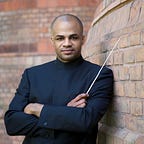Out of Quarters and the Music has Stopped!
Classical musicians aren’t essential workers during the corona epidemic, and it’s rightfully killing us.
Covid-19 has thrown the health of classical music institutions in limbo. When one’s mission isn’t linked to the needs of our most underserved communities, when the chips are down, they’ll quickly tell us that our art isn’t theirs and is therefore inessential.
During corona, the term “essential worker” has become code for lowage people of color. These are the very people many don’t believe should make $15 an hour. Suddenly, they‘re the very people relied on to keep the music of daily life playing.
Prior to Covid-19, classical music’s ecosystem was already fragile by the purposeful exclusion of underrepresented people of color. Although actively extending cultural membership to underrepresented minorities would give organizations more money in times of strife, these organizations historically haven’t banked on us, but profit from our exclusion. We judge the quality of space by the absence of people of color. Good schools are white. The good neighborhood is white. Concert halls aren’t different.
Classical music is used to divide society, between the haves and have nots. White musicians — the majority — empathize with those most like themselves, eschewing people of color. Audiences dwindle, orchestras/institutions lose relevancy, and in times of economic peril — like now — society reminds classical musicians just how expendable we are.
we’re expected to keep putting quarters in a machine that’s broken by racism and classism, designed to exclude the cultural repertoires and narratives of those racially marginalized and disenfranchised by the classical music industry.
As classical musicians, we’ve sequestered ourselves to exclude the majority. It’s a field controlled by white conservatism and devout homophily, with little wiggle room for heterophily. It goes undiscussed because it makes folks in power feel angry, nervous, racist and classist.
Institutionalized racism remains front and center. Classical musicians are almost exclusively represented by the less melanated. If this doesn’t bother you, you are overtly racist.
Classism and the Bourgeoisie
Mozart hated the aristocracy. One can hypothesize his exclusion of the perfunctory third movement dance form (Minuet and Trio) from his “Prager” Symphony was to empathize with Bohemian displeasure of all things aristocratic. He represented the taste and needs of the people. Why hasn’t this level of profound cultural insight continued?
Classical music’s institutions must link their mission to serving the needs of their community — specifically the most underprivileged/underrepresented — in order to remain relevant. Catering to the lowest common denominator in society affords access for all.
In the US, it goes without saying that class is inextricably linked to race.
The majority of concert goers are from the lauded white middle class (bourgeoisie). In social discourse, those below middle class are highly stigmatized in the US as uneducated, undesirable, lazy, unintelligent and uncultured. The middle class is 20% of the population. 100% of the population is expected to fit into 20% of the population. It’s impossible.
For classical music to thrive in times good and bad, we must include those outside the middle class by extending cultural membership to all social classes.
If we’re not pied pipers of spiritual and cross-class/cultural sustenance, do we really deserve to exist in 2020 as musicians?
Learning from Corona
Will the coronavirus change the modus operandi of classical music’s white institutions, or will they continue to be racially exclusive?
Music lets us equitably see our unique beauty in others. As musicians, it allows us to model ideal relationships, learning who we are in relation to others. Music teaches us what it means to be accepting humans. Sadly, most refuse to hear this lesson.
As musicians, we must be interested and mindful of different cultural narratives and repertoires instead of catering to homophily. Homophily is the tendency to socialize with those most like us. Embrace heterophily.
There is a grave lose when we don’t include underrepresented voices of color in our music making. People don’t evolve from isolation. They speak with the weight of their ancestors and the endurance of their history, race and ethnicity. However, classical music in the US has never allowed for the equitable representation of all voices. The US is defined by the exclusion of those not at the constitution’s table — a topic for another day.
The representation of artists in classical music must reflect the society we live in. It never has, probably never will, yet we’re expected to keep putting quarters in a machine that’s broken by racism and classism, designed to exclude the cultural repertoires and narratives of those racially marginalized and disenfranchised by the classical music industry.
We don’t need to save music, music needs to be saved from us.
Noted conductor, educator and activist Brandon Keith Brown engineers society from the podium by decreasing the racial stigmatization of underrepresented minority classical musicians. Brown is a prizewinner and the audience favorite of the 2012 International Sir Georg Solti Competition for Conductors, and guest conducts prominent European orchestras including the Rundfunk Sinfonieorchester-Berlin, Badisches Staatskapelle, Staatskapelle Weimar, members of the Vienna Philharmonic, and the Jena Philharmonie among others. Upcoming debuts include the Konzerthaus Orchestra Berlin, WDR Funkhaus Orchestra Köln, and the Cape Town Philharmonic. Upcoming debuts include the Johannesburg Philharmonic, the Slovak State Philharmonic Košice and the Simon Bolivar Symphony Orchestra. He is a student of David Zinman, Lorin Maazel, Kurt Masur, and Gustav Meier. graduating with a master’s from Johns Hopkins University. Initially trained as a violinist, he attended the Oberlin Conservatory of Music studying under Roland and Almita Vamos.
A noted social justice advocate, Brown’s writings on race have been featured on The Medium and in the Berlin Tagesspiegel. He is a frequent podcast guest and speaker on the intersection of race in music and education.
Email: info@brandonkeithbrown.com
Website: www.brandonkeithbrown.com
Instagram: @brandonkeithbrownconductor
